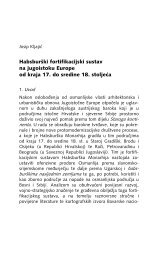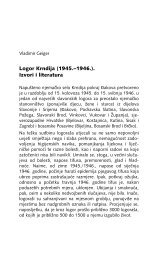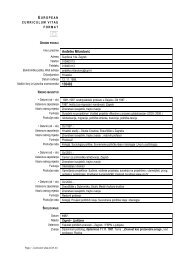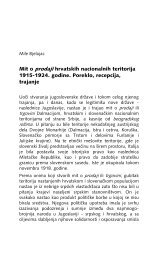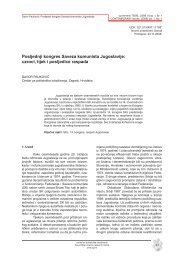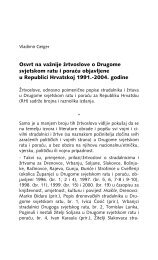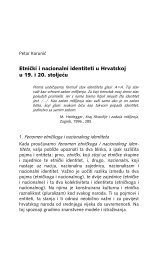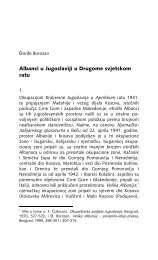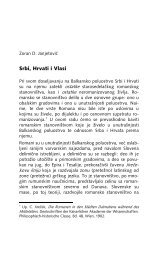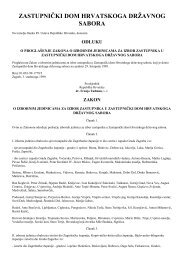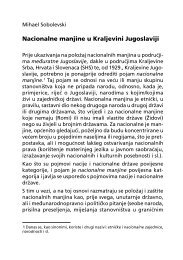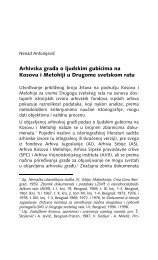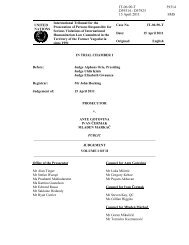ISSN 1847-2397 godište II broj 1 2009. | volume II number 1 2009
ISSN 1847-2397 godište II broj 1 2009. | volume II number 1 2009
ISSN 1847-2397 godište II broj 1 2009. | volume II number 1 2009
- No tags were found...
You also want an ePaper? Increase the reach of your titles
YUMPU automatically turns print PDFs into web optimized ePapers that Google loves.
Plamena Pehlivanova: The Decline of Trust in Post-Communist Societiessuvremene TEME, (<strong><strong>2009</strong>.</strong>) God. 2, Br. 1CONTEMPORARY issues, (<strong>2009</strong>) Vol. 2, No. 1seem to fit the NPC model proposed by Clark.In the Bulgarian and Russian case studies,the family has become the basic factor forpolitical socialization and milestone for shapingthe new civic culture. The economic instability inthe two countries has enforced the strength ofthe family unit, while it has also increased thedistrust toward local institutions and authorities.The social capital cannot be sought as a productof intermediary organisations, as De Tocquevilleargues, but has allocated itself in the isolatedfamily unit structures and the informal social folklorepractices. Wedding processions, socializingover coffee, sitting parties and unofficial folkloredance collectives are types of these unofficialsocio-cultural scenes in Bulgaria that encouragesocial participation in contrast to the institutionalizedorganisations. To relate it internationally,this unofficial cultural model of Bulgaria andRussia is similar to Spain’s informal social sceneof Pandillas and Movidas. Furthermore, thesesocial practices reveal a continuation of folkloreculture that is built around the family structureand inspired by an oral tradition. Folklore practicesin general have been formed in a more intimatescale and have become situated aroundthe circle of family and relatives.Even though personal relations seem togenerate trust and intermediary organisationsdo not, we should consider the social trust thatis directed toward the national institutions. If thepersonal relations and family circle provide trustand other organisations do not, then how do weexplain the trust in EU institutions that Eurobarmeter(2008) reports?“Trust in the European Union amongBulgarians is higher than the trust inother international organisations, suchas NATO and UN. The high level of trustin the EU and its institutions is in sharpcontrast with the new wave of mistrustin the Bulgarian institutions.” (StandardEurobarometer 70, 2008)Unlike the average EU citizen, but similarto the new member states, Bulgarians trust onlythe European Union, its institutions and internationalorganisations. Also, at least every secondBulgarian trusts the European Commission (BG- 51%, EU27 - 47%) and the European Parliament(BG - 57%, EU27 - 51%), and almost halfof those polled trust the European Central Bank(BG - 49%, EU27 - 48%) and the Council of theEU (BG - 46%, EU27 - 42%). On the contrary,mistrust in the Community institutions is on therise in the EU27, but in Bulgaria it has droppedand is now half the EU average for each and everyEU institution. The Bulgarians show highestmistrust in the country’s political and executivepower. In contrast to the Bulgarians, the regionaland local authorities gain the highest level oftrust among citizens in the EU (50%). However,Bulgarians reports of mistrust towards nationalgovernments, parliaments and the judiciaryprove to have the highest levels and the lowesttrust scores in the whole Eurobarometer survey.7. ConclusionAlbeit enthusiastic about their future atthe beginning of the twenty first century, the citizensof Bulgaria and Russia display more apathy.Observing the development of post-communistsocieties has further proven that democraticconditions do not always co-exist with the vigorouspolitical activism and civic associations.Instead, as stated by Nikolay Valkov, low associationalactivity rates in these countries shouldbe understood as something, which has its owninternal logic and explanation (Valkov, <strong>2009</strong>: 14).These social patterns can be explained by theinfluence of cultural folklore on the social mentality,or through the institutional structures andpolitical actors that are seen as responsible forthe social welfare. While the social and economiclevels in Bulgaria and Russia remain unstable,the cultural significance of the family structurewill remain a stronger institution for the provisionof social capital and trust than the intermediaryand government organisations. Even with theprogression of post-materialist values in thesesocieties, the family will remain a traditionalenforcer of moral values and cultural patterns.Thus, we have witnessed that both post-communistsocieties portray an ecology-dependentstructures that establish cultural and social patterns.The unsatisfactory financial status of individualsand the generational differences in thetwo societies also influence the levels of distrustand political and civic participation. While pessimisticabout the political institutions and theirquality of life, Bulgarians have shown high expectationstowards the European Union. Particularsupport and optimism has been reflected byyoung people between 15 and 24 years of age.In general, the Eurobarometer (2008) reportsshow that Bulgarians have become less pessimisticin national terms and more realistic in theirEuro-optimism and the role of Europe in the futureof their country. According to these results,centar za politološka istraživanjathe political science research centrewww.cpi.hr45



